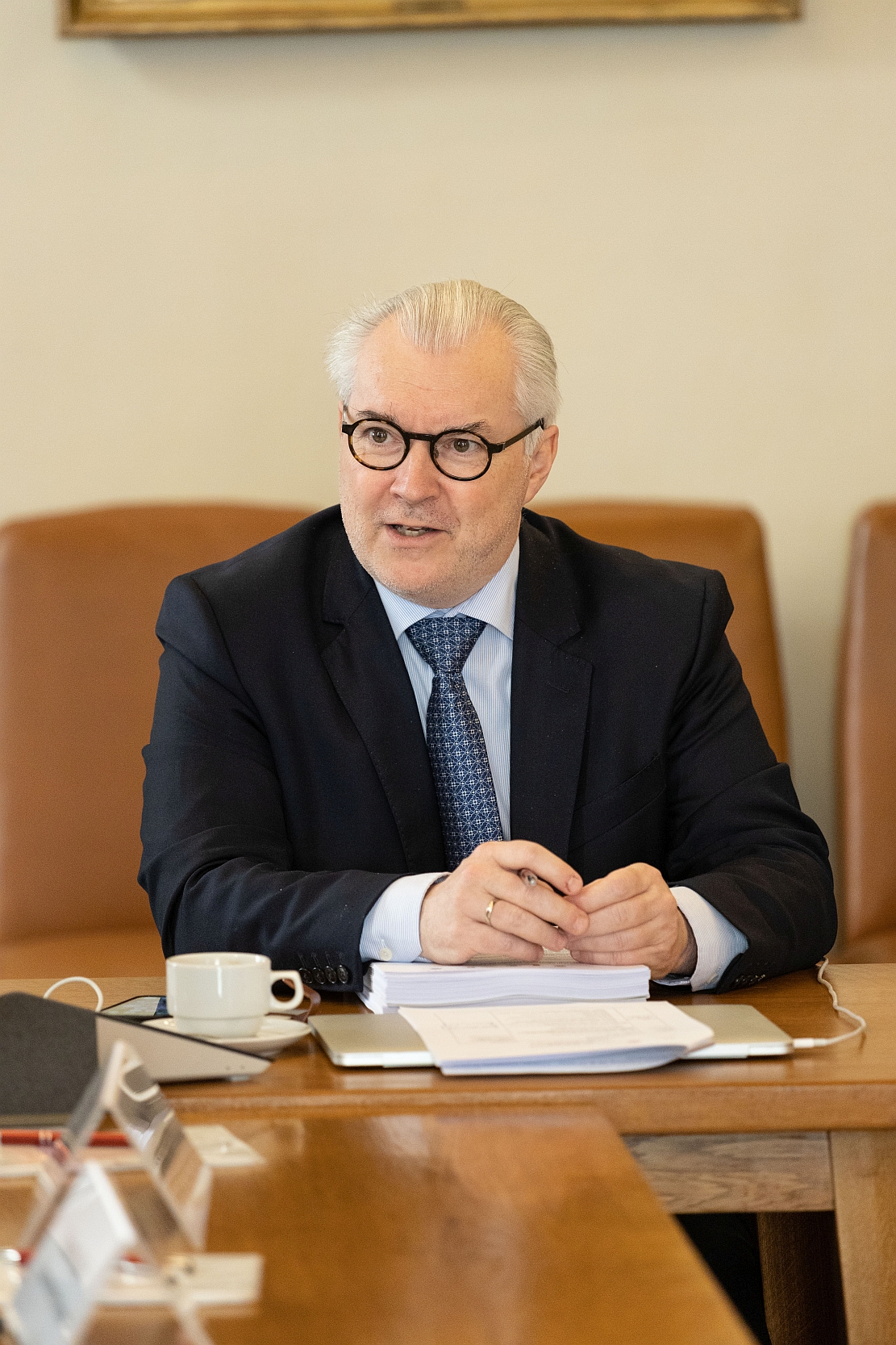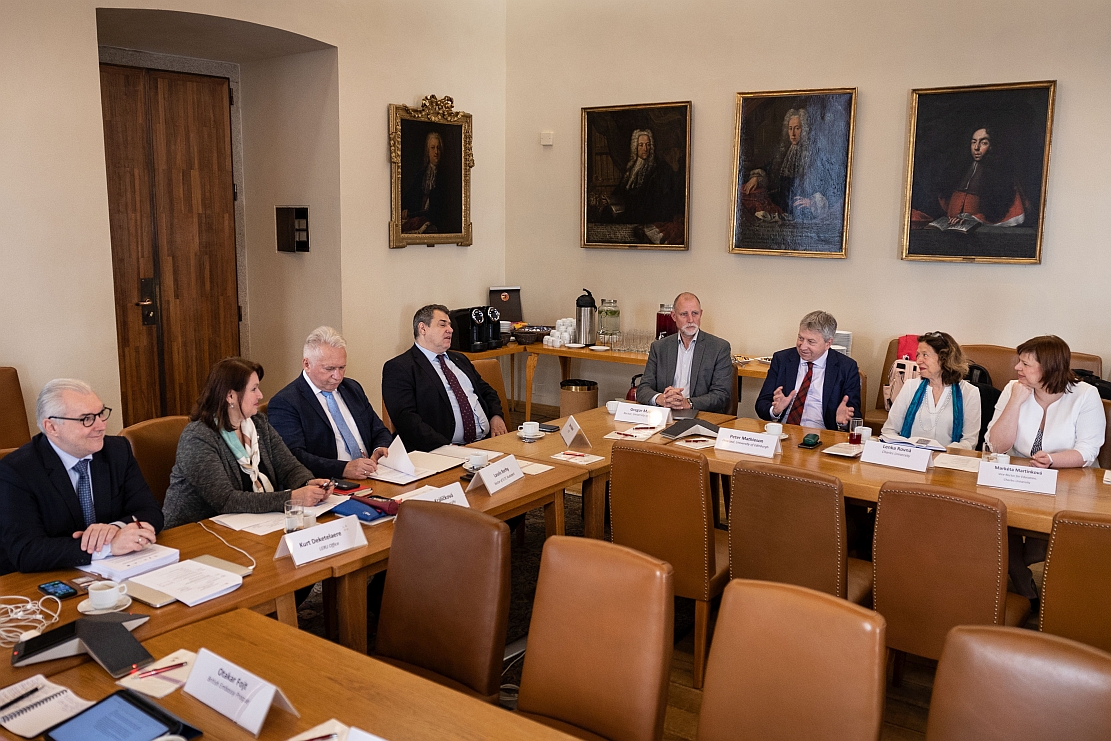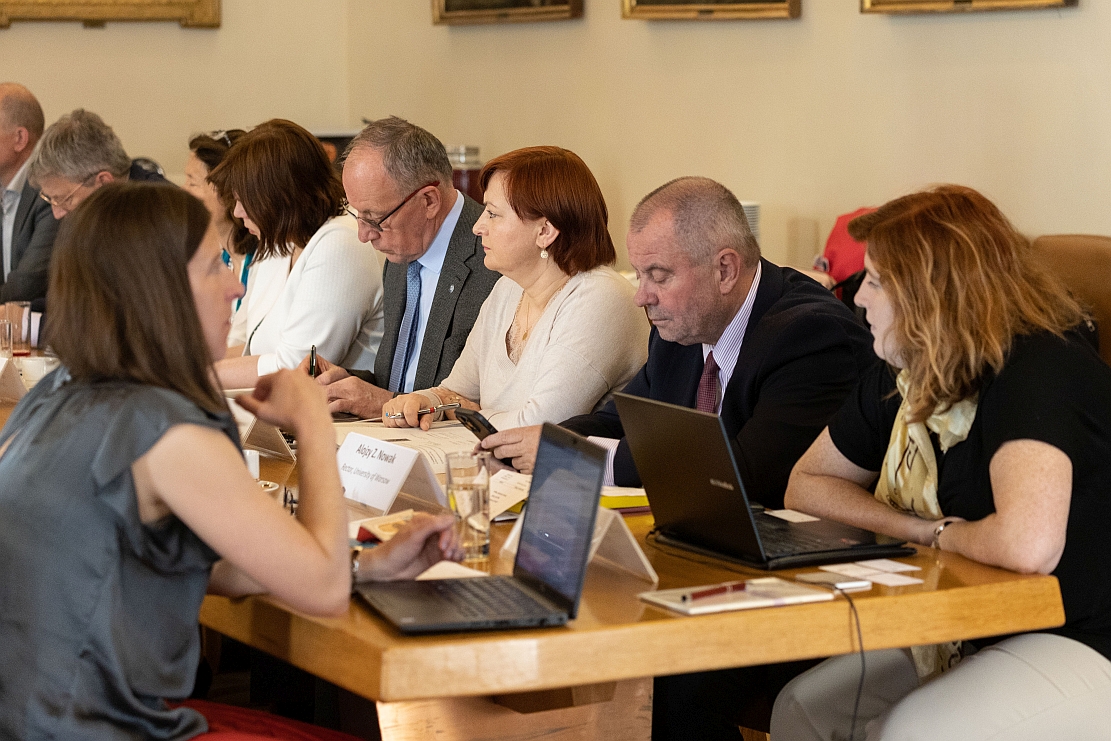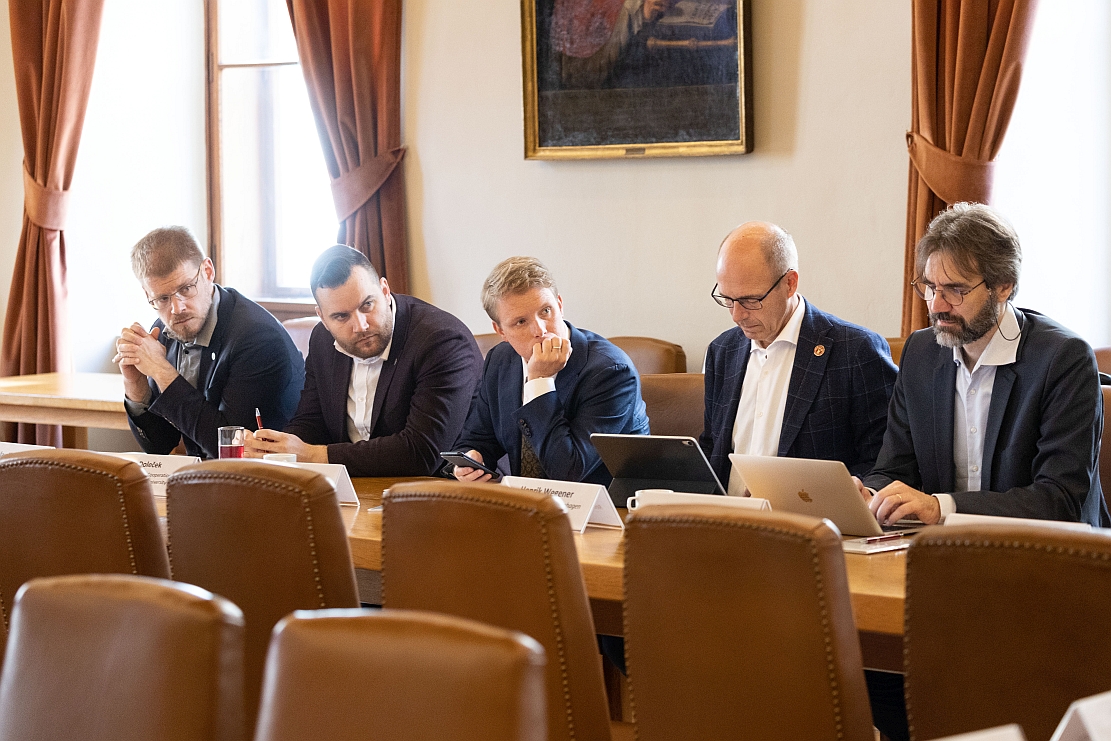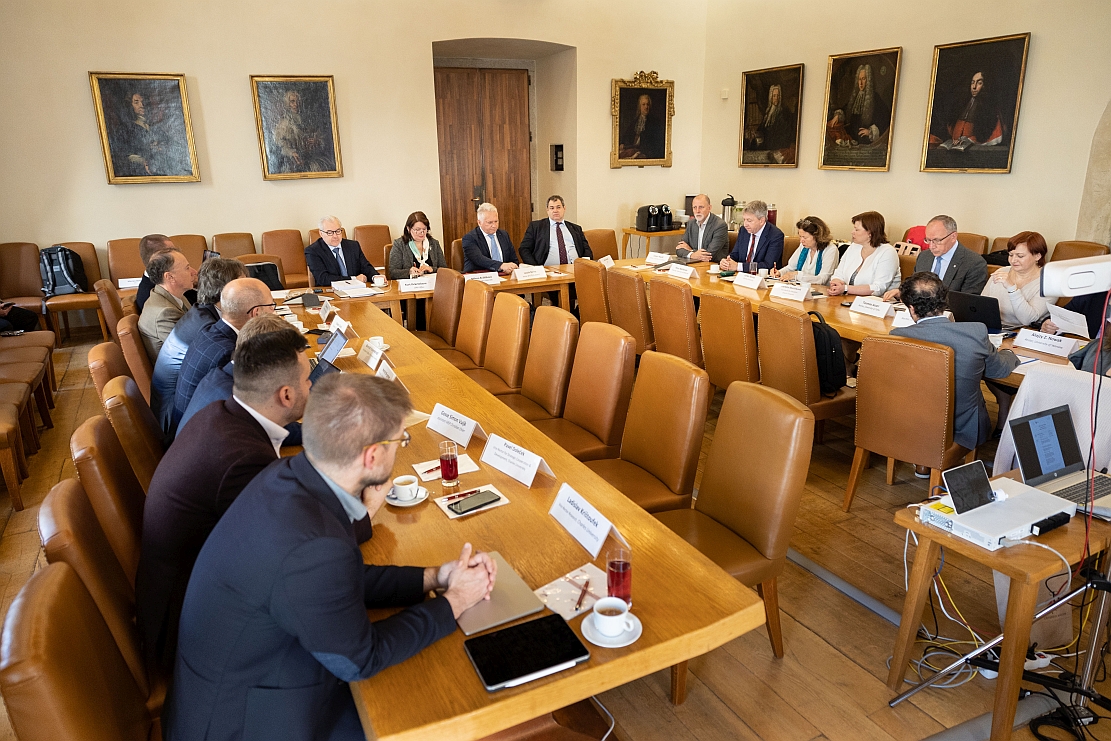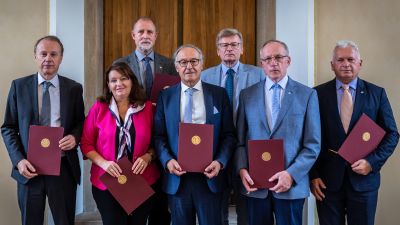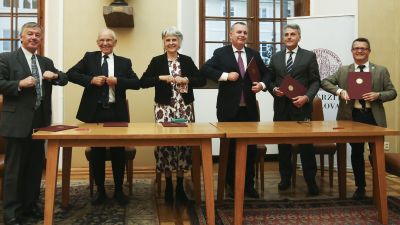On 26 and 27 May, Rectors from LERU and CE7 universities met at Charles University, Prague, at the invitation of CU Rector Milena Králíčková. The meeting was the first of two planned this year.
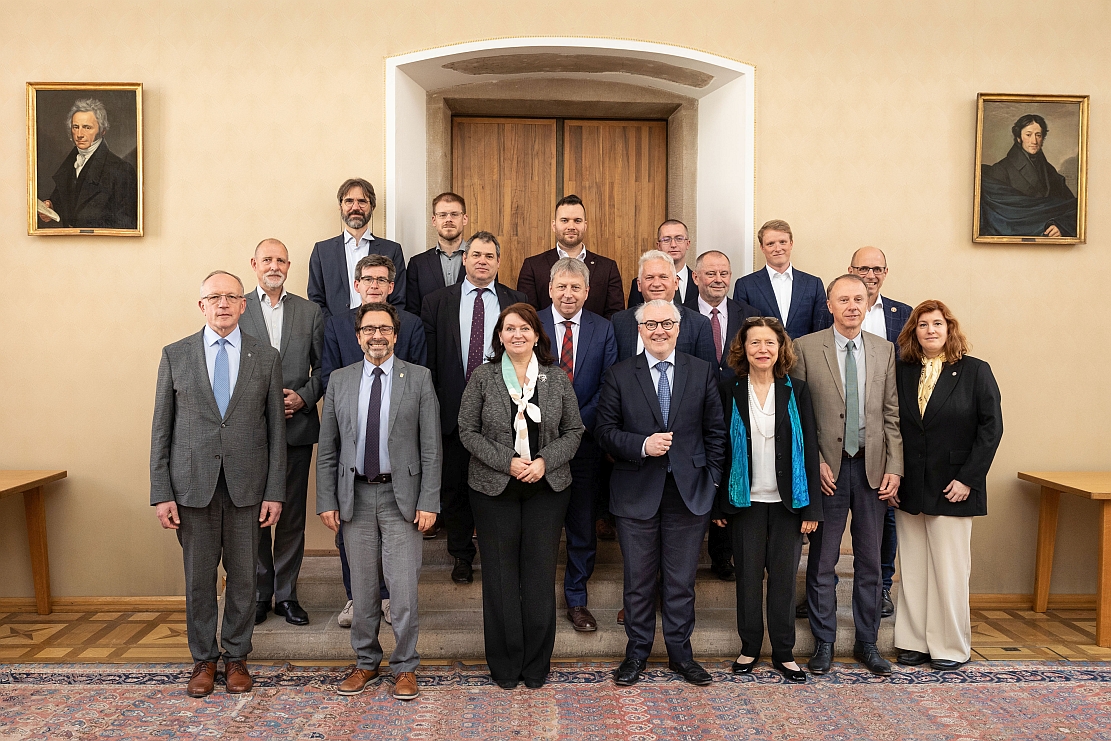
Charles University hosted a productive LERU-CE7 Rectors' meeting on May 26-27 looking at key issues facing European universities.
The second day of the meeting opened with Rector Králíčková welcoming esteemed rectors to CU, with some of them attending the LERU-CE7 meeting for the first time. Topics on the agenda – at the meeting and into the future – included academic freedom as well as gender balance and equality – with Rector Králíčková expressing a strong interest in Charles University hosting a special upcoming meeting on the latter issue.
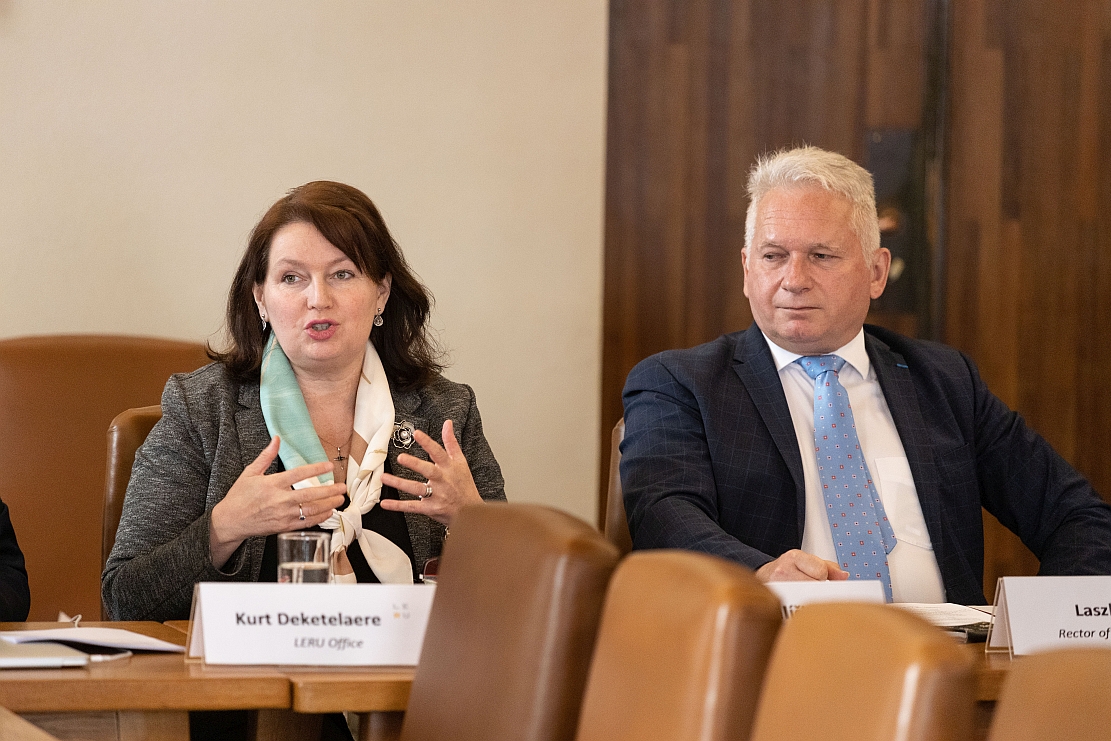
Charles University Rector Milena Králíčková speaks at the LERU-CE7 Rectors' meeting on 27 May 2023. To her right is Rector Laszlo Borhy of Elte.
After Professor Králíčková, the first to speak was LERU Secretary-General Kurt Deketelaere who brought attendees up to speed by discussing recent LERU-CE7 activities and providing an overview of developments happening in the near future.
His presentation could perhaps best be described as a kind of ‘road map’ for continuing LERU-CE7 cooperation, able to progress more and more efficiently since, for example, the pandemic abated. “This is what we have been doing over the last few months… I think we can be satisfied with the direction our cooperation has been going,” the LERU secretary-general said.
Gosse Simon Vuijk, an assistant to MEP Christian Ehler, followed, giving a detailed update on the European Parliament’s activities on academic freedom. He included specifics on the EP Forum for Academic Freedom, which is a STOA initiative that will be producing an independent report about the state of play of academic freedom in the European Union. The topic prompted vibrant discussion about ways academic freedom had been tested or was suffering encroachment in areas that would have been unthinkable not that long ago.
After a short break, proceedings continued with a presentation on the access of Hungarian universities-public trust foundations to Horizon Europe and Erasmus, given by Professor Laszlo Borhy, the Rector of the Eötvös Loránd University (ELTE) in Budapest and the President of the Hungarian Rectors’ Conference. He emphasised that the Hungarian state universities still have full access to Horizon Europe and Erasmus.
The rectors also discussed the European Universities Initiative. Professor Barend van der Meulen of the Center for Higher Education Policy Studies (CHEPS) at the University of Twente, presented the report ‘The European Universities Initiative: first lessons, main challenges and perspectives’.
Afterwards, MEP Michaela Šojdrová, Vice-Chair of the Committee on Culture and Education, shared her views on the initiative.
Michael Browne, CEO of Crowdhelix, Europe’s leading Open Innovation Platform, also joined the meeting and gave an introduction about the company's activities in favour of research universities. Last but not least, Dr Marian Belko closed the meeting with a presentation on the EIT Campus and the Deep Talent Initiative of the EIT.
During a break in the meeting, Forum had a chance to discuss progress made with LERU’s Kurt Deketelaere:
How has the current period differed from what came before?
It’s clear that we got a number of things done in our cooperation over the first five years but what we were not able to do as effectively in that period was really reach out from the level of the rectors to the academic working floor or the central services of universities. And obviously for a network in the making, that’s always the challenge: to make sure that not only the rectors are involved but also the faculties, the central services, the individual staff members. Our explicit goal in the second phase was to turn that around and we did. The importance of seminars we have organised now is to bring in and connect with our academics, to work on communication and joint action. And it shows: the last nine months we have been able to hold activities every month, publications, involvement from academics, rectors, vice-rectors, staff members, and it is clear we are gaining ground with the CE7 universities.
You see it in evidence at our meeting today. The University of Ljubljana is inspired and interested in holding a smart cities event; Charles University’s rector immediately expressed interest in hosting a gender initiative, the rector of the University of Warsaw is interested in hosting a two-day event, these are all signs that we all see that this is an important collaboration worth investing in. And we know, at the same time, that that isn’t easy because rectors, vice-rectors, deans and other staff members also have to respond to European alliance memberships [and balance both]. It’s not that I dislike alliances, which was jokingly mentioned today, but there are now so many and the competition is great. It’s just that they cannot act like mini-LERUs and lobby [on all fronts in a vastly different way and we have to be on the same page].
The second point is that university alliances cannot lead to a situation where EU money for research innovation would be diverted in a non-competitive and not excellent way. For a network like LERU, obviously we have to master competition with other networks. A lot really depends on the rectors themselves: I know rectors who are heavily involved in mobilising staff for those alliances. So it is good to see that the support for LERU is growing on both sides, that the activities are increasing, the output is very visible now, and that we will also be able, within the framework of Horizon Europe’s successor FP10, to be able to team with LERU and CE7 and the Guild. And of course two CE7 members are part of the Guild while none are a part of LERU.
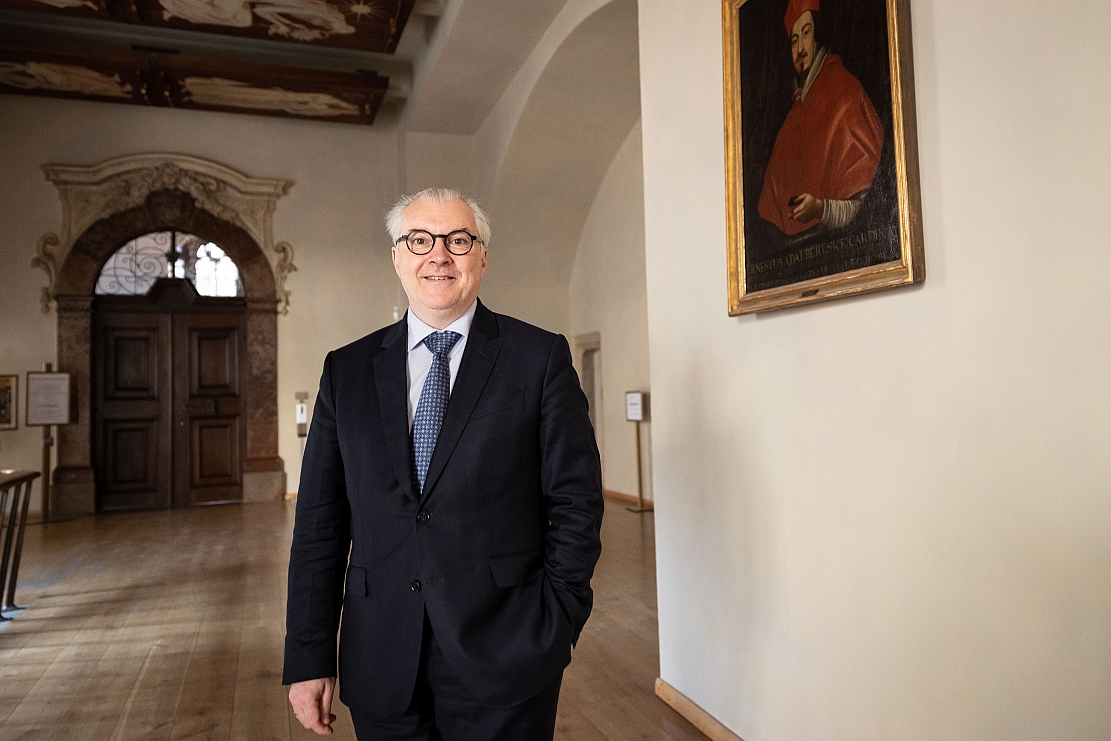
Kurt Deketelaere, the Secretary-General of LERU - the League of European Research Universities, at the Carolinum in Prague on 27 May 2023.
You mentioned just how unusual it is for LERU to sign on to a partnership, but that CE7 was the exception. What was different about the CE7 that made that the case?
We don’t normally do that as we don’t want to become dependent on other actors with different goals in mind. We found in CE7 a group of universities whose goals were the same: if we are honest, while their overall research output level, funding or research excellence are not yet at the level of LERU, the ambition is there. And we have committed to helping them get to their highest level. This isn’t something we see as voluntary but as a necessity: we cannot afford to have a Europe and European Union where there is a huge difference in research intensiveness of universities north, east, south, west. Because, at the end of the day, the union is developing a research and education and innovation policy for the whole union, not just LERU’s 23 universities. And we want to be sure that at the EU level there will be a minimum of differences in speed and integration and other factors.
At the end of the day, if a large group of member states becomes dissatisfied are because they are left out, are unsuccessful in applying for ERC funding or Erasmus, unsuccessful at the European Innovation Council, there will come a point when they will question why they support that. Why would we put 100 billion euros in a research fund if we are not going to be successful? So on our part it is a combination of self-interest but also a commitment that we share with those seven universities here that we can improve the world in which we live.
The narrative also that central or eastern being far behind is not true: there are pockets of excellence where they compete fully with the rest of Europe or are more ahead even than some. If we join forces we are far better positioned to push as much as possible for EU-wide support for research and innovation and we can only do that if everybody is on board. It is impossible for LERU to do on its own. We are still seen as some kind of elitist club in the northwest of Europe but what we are pushing for, especially for research-intensive universities, is developing policies like we discussed this morning on issues such as academic freedom, gender policy, innovation, risk-management. We hope and we are quite sure we are providing assistance to making things better.
By helping others, you are helping yourselves…
Everybody gains. It’s win-win. We have to win together, not on our own.
The next LERU-CE7 meeting will take place at the University of Warsaw on 22 and 23 September 2023.


